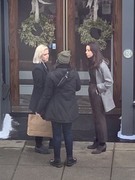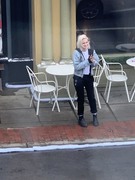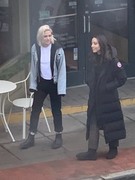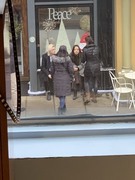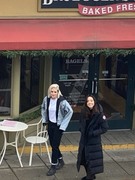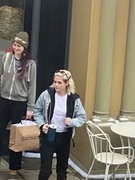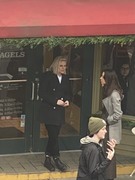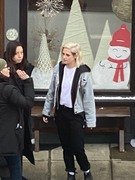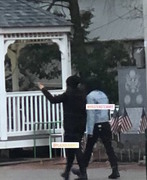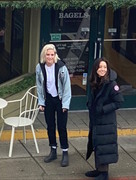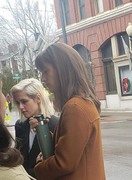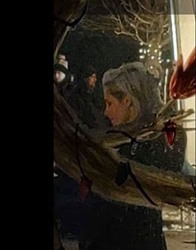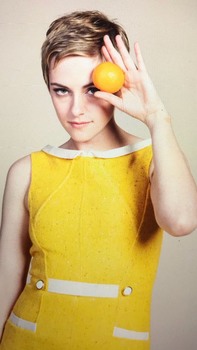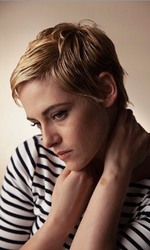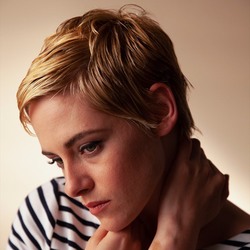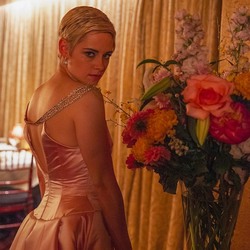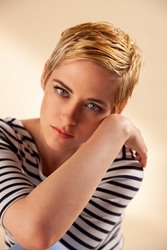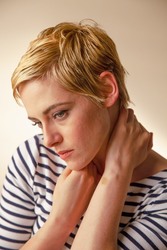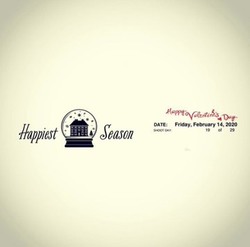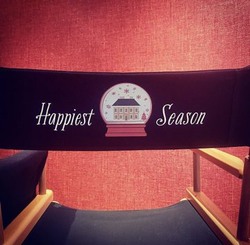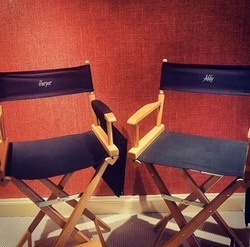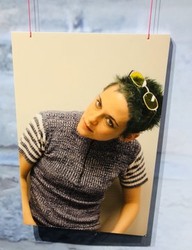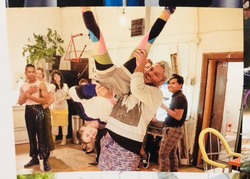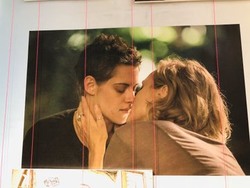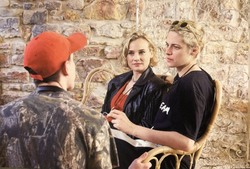Source
Home
- Home
- Team Kristen
- Affiliates
- Wins and Nominations for 'Spencer'
- Cannes Film Festival 2018
- American Ultra
- Anesthesia
- Billy Lynn's Long Halftime Walk
- Cafe Society
- Camp X-Ray
- Certain Women
- Chanel
- Charlie's Angels
- The Chronology of Water
- Crimes of the Future
- Clouds of Sils Maria
- Come Swim
- Equals
- Happiest Season
- JT Leroy
- Lizzie
- Love Lies Bleeding
- Love Me
- Personal Shopper
- Seberg
- Spencer
- Still Alice
- Underwater
- Scheduled Appearances in 2026
Friday, February 28, 2020
Monday, February 24, 2020
Friday, February 21, 2020
Kristen's interview with the SF Chronicle Datebook on 'Seberg' and more
Who better to play Jean Seberg, the American actress who went from Hollywood star to icon of the French New Wave, than Kristen Stewart, a Hollywood star who became the first American actress to win a Cesar Award for acting in a French film?
The similarities don’t end there. Seberg’s career was “very hopscotch. Very similar to mine,” Stewart said.
And both took more than their fair share of lumps in the media, Seberg during a rough beginning to her Hollywood career and then, most famously, while facing intense scrutiny after becoming involved with the Black Panthers in the late 1960s. That period is the subject of the new film “Seberg.”
Stewart, meanwhile, experienced a meteoric rise as star of the megahit “Twilight” series and gained an intense fan base that follows her every move. And, fairly or not, every movie she has made since the conclusion of that series in 2012 has been scrutinized over its box office success — or lack thereof — as well as what she brought to the film artistically.
“That I can totally relate to — that platform turning against her so violently is something I have superficially tasted, so the feeling of being out of control of that made me feel all the more understanding of her particular plight,” Stewart said during a visit to San Francisco in October, the afternoon before she received an award at the Mill Valley Film Festival. “Just in terms of growing up and achieving a certain level of acknowledgment that requires you to interact with the press and the public at large, there are times when things just don’t seem true, no matter how hard you try and convey yourself.
“Just having lies written about you, and people hounding you … but obviously, I was never attacked in the way that she was.”
“Seberg,” which opens in the Bay Area on Friday, Feb. 28, is the third film starring Stewart to open since November — after “Charlie’s Angels” and “Underwater.” It takes place mostly in California and Paris during the late 1960s, almost a decade after “Breathless,” when Seberg was under FBI surveillance for being involved with the Black Panthers, operating in Oakland and Los Angeles. Directed by Benedict Andrews, it co-stars Anthony Mackie, Zazie Beetz, Vince Vaughn and Margaret Qualley.
It’s also an example of the underrated part of Stewart’s career: her penchant for making interesting independent films, from starring as Joan Jett in “The Runaways” to making two films in France with noted director Olivier Assayas: “The Clouds of Sils Maria” and “Personal Shopper.” Also recommended: the 2018 indie “Lizzie.”
“I love independent films more than anything,” Stewart said. “I love them! But it’s not a ‘One for me, one for them’ thing. I’ve honestly been drawn to the larger movies I have been involved in, and then I’m like, ‘Oh, OK, I gotta switch it up.’ … Even in between all the ‘Twilight’ movies — we did five of them — I did one or two other indie movies. I’ve always been lucky enough to find things that stimulate me and people I want to align myself with in a lot of different realms.”
If anyone seems well equipped to navigate the ups and downs of Hollywood, it’s Stewart. Born into a show business family (her mother, Jules, is a script supervisor and directed the indie film “K-11”: her father, John, is a stage manager), she became a child actress, most notably as Jodie Foster’s daughter in David Fincher’s “Panic Room.” Even though she is just 29 — she turns 30 in April — Stewart has been in the business two decades.
So naturally, she wants to direct.
“Oh, hell yeah!” she said with a laugh. “I’ve been wanting to direct since I was a little kid. … Being so young and working with Fincher was interesting because I didn’t know how anyone else worked. So his sort of radical, kind of fierce immersive way of working was instilled in me at a young age. I thought it was fun because everyone was kind of at their wit’s end. It gives the set kind of this awesome feeling, like the only thing worth doing is something that really pushes you. And I loved that. I loved doing 60 f—ing takes and being like 10 years old and being like, ‘Yeah, we gotta keep going!’ ”
Stewart, who directed a short film called “Come Swim” to, uh, test the waters (it’s on YouTube), is preparing her feature debut, “The Chronology of Water,” an adaptation of a memoir by Oregon writer Lidia Yuknavitch. She hopes to begin filming this year.
“Honestly, it’s not arrogance, because it takes such a large group of people to put a movie together,” Stewart said, smiling. “But a commitment to a singular vision is pretty crazy behavior. It’s a gnarly claim to be like, ‘I’m going to direct a f—ing movie. I’m going to make it myself.’ Literally, like, all of the decisions are up to me.”
She said she learns from each director she works with from Fincher to Assayas (“Someone like Olivier is much more meditative, quiet, but still has that feeling like you’re doing the most important thing in the world”) to Sean Penn (“Into the Wild”), Walter Salles (“On the Road”), Woody Allen (“Café Society”) and Ang Lee (“Billy Lynn’s Long Halftime Walk”).
But lately she has been watching work directed by women for inspiration as well. Her current favorite director is Scottish filmmaker Lynne Ramsay, whom Stewart called “honestly one of my heroes.
“I watch her movies, and I really feel like in certain ways my perspective or transient, impressionistic ways of making a film are so substantiated by her work and how impactful it is and completely concise, while also being quite sprawling. So she’s my f—ing favorite. I love her so much. I’m very fixated on her right now.”
Directing is also one way for Stewart to further shape a career she admits has been random. “When I was younger, I never felt like any of my choices were super tactical,” she said. Now, as she turns 30, the self-proclaimed workaholic said she doesn’t feel a window is closing but that new ones are opening up.
“If I could stay on the track that I’ve been on thus far, I’d be very happy,” Stewart said. “I’ve never been bored in my life. I’ve somehow continuously found things that I’ve found not just redeeming, but wonderfully maddening. I’m never not obsessively working. If I could maintain that, I’d be very happy, and I’d probably live a long time.”
Source
Benedict Andrews talks 'Seberg' and Kristen with Screenrant
Jean Seberg is a legendary actor who American audiences and younger generations might not be as familiar with as they should be. Do you feel a certain responsibility to point out to viewers why she was so important, why she was persecuted, why she deserves to be remembered and championed?
I don't think it's even generational. I think it's part of her story that people know her as an icon from Breathless, but then her career never catapulted. She was very famous when she was cast as Saint Joan and had this immediate moment of fame, but there's a shadow over her legacy, and it may well be to do with the events that the movie portrays. I feel an enormous responsibility to shine a light on this part of her life, the injustice that happened to her. But more than that, I feel it's the responsibility of a filmmaker, whether the character is living or fictional, to find and enter into the emotional truth of that character. The film looks through a very specific window into her life, but in that, we're trying to kind of leave a trail of clues. The Jack O'Connell character, he has the same questions as some of the audience: "Who is Jean Seberg?" By him drilling into her life, we're able to start pulling threads and leave trails for people to follow about her past. We don't try to tell the whole story. That would be a whole other thing.
That would be a miniseries.
Every character in the movie, and Jean herself, there would be multiple miniseries, because their lives are so complex and fraught and loaded. But we deliberately narrowed to these couple of years at the end of the 60s. But at the end, we leave trails for people to follow, like the burning in Saint Joan, when she was burned on that set, and all these little clues. But each aspect of her life is so extraordinary. We barely touch on her marriage to Romain Gary, which is a fascinating story in itself. I feel it's an invitation for people to get closer to her. We wanted to get closer to her in the period the movie covers, and to show the FBI's campaign against her, both from her side, as someone going under and being driven mad by that experience, but also from the other side, with Jack watching her. But yes, there's an enormous responsibility to her legacy, and to not allow her story to disappear. Politically and culturally, it's a hugely important story that seems to chime with the current moment that we're living in.
For sure. Just watching the movie, it's so telling how the FBI's campaign against her and the Black Panthers was all about reducing her to a hysterical woman, and them to a bunch of angry black guys who want to overthrow the entire government. Kind of how equality becomes conflated with supremacy, and how it's weirdly inverted now, with white nationalists who feel disenfranchised because they believe white supremacy is being threatened. It's wild. Those false equivalencies. And they were successful with Jean, because she's so comparatively obscure today.
And also successful because of the destruction of those relationships. The destruction of her political relationships, as well as personal ones. I mean, what happened to Jean was just the tip of the iceberg. As the Anthony Mackie character says, she's caught in the crossfire of white America's war on black America. There's not really an equivalence in terms of the war on those activists. We hint at it; for instance, when you see the school destroyed, it's devastating, and a direct consequence of this kind of warfare that Vince Vaughn's character represents. A secret, dirty war. In Jean's case, she's giving financial support and she's holding fundraisers. She's not even necessarily giving a huge public voice. There were other activists, like Jane Fonda and Marlon Brando, who were a lot more in the public eye for their actions, but even for that, and for crossing those boundaries, the machinery of the state surveillance is turned against her. There's a real loss of those productive relationships between Hollywood and the black activists. People who genuinely believe in changing their country and a woman who was horrified by injustice in her country and trying to find a way to change that. And to see her sense of truth destroyed, and her private life destroyed. But, of course, those legacies still continue in a really positive way, too.
Yes. I think you see it a bit in the "shut up and sing" mentality that pops up on Twitter all the time. Like when Joaquin Phoenix won his Oscar and gave an important speech about what he believed in and got mocked online. I mean, that's obviously nowhere near on the scale of what was done to Jean, but maybe it's a vestige of that relationship... But one thing that's really uplifting is the all-star cast that you assembled for what I imagine is not a hugely-budget movie.
It is not. (Laughs) Which, also, you know, is one of the achievements of the whole team. It's an extremely elegant movie. She was an elegant woman, but the movie also crosses these different worlds and we needed to create and do justice, on a period level, to all of those worlds. I wanted each of those worlds to have their own photographic beauty and so on. On our budget, that was a real challenge, but an accomplishment I'm really proud of. But you asked about the cast?
Ah, we can circle back to them, we've got time. I've talked to people who've done period films before and they've all sighed and gone, "It's not easy." Any anachronism sticks out like a sore thumb. It takes a lot of work to make sure every car is period-appropriate, every prop, every costume... And her costumes are amazing.
Yeah, Michael Wilkinson (Justice League) did an incredible job.
That scene where she tells Anthony Mackie that she's pregnant, and she's wearing that yellow and black outfit, it's just gorgeous.
He's a genius, Michael. And he works beautifully with actors. I've been particularly impressed with those clothes in American Hustle. What he gets away with with all of them, but you can just see the trust of the actors, in particular the actresses in that movie. With both elegance and sophistication, but also the way the clothes talk. We couldn't afford to go outside that much. Another movie set in the late 1960s was being shot at the same time, with something like, 11 or 12 times the budget. Margaret Qualley is in both, though! (Laughs) I remember, I was coming home at 3:00 AM or something, after a late shoot, and I got stopped at the traffic lights on the corner of Hollywood Boulevard. We'd been recycling our couple of period cars, and we got stopped for, like, eight minutes while Tarantino's period cars went by.
Oh my gosh, a convoy!
There's his budget versus our budget! But still, I'm incredibly proud that we got such a true and non-cliche sense of period across all of those different worlds. The movie, in a way, is also about that intersectionality of worlds. Jean is a boundary-crosser. From the first minutes of the movie, she goes from the Left Bank of Paris, where she lives with Romain Gary as the darling of La Nouvelle Vague, and then she crosses to 1968 LAX, meets the Panthers, goes to her exquisite glass house in the Hollywood Hills. Going crazy by herself, chucking ice cubes into the pool, she decides to drive down to Compton. And that's all within the first ten minutes of the movie, we cross those worlds. And Jack's first day at work, and suburban L.A., in the belly of the beast in the FBI building. Jean's a boundary-crosses, moving across all of those different worlds. So the story becomes about a woman who is testing these boundaries and crossing these borders, and the movie had to do that, had to move between all of these different worlds and kind of contrast them and get them right, but it also becomes about these borders being crossed, and the way the FBI are interested in someone who is violating that. And they are on this border, too. There's a beautiful scene, early on, when Jack's in the van, and in an homage to The Conversation, the camera drifts out through the car and onto two women doing their makeup. It's a metaphor for cinema, since he's sitting there, looking at these two people through a screen with his camera there. That delicious kick of voyeurism is similar to what the audience is getting. That's one of the things that appealed to me on a cinematic level. This woman, who lives her life in public as an actress... And I've spent my life working with incredible actors in the theater, and their job is to kind of go into their private – all the stuff we usually keep hidden, that we're not meant to show other people – the actor's job is to dig into that and use their memories, their emotions, expose their raw nerves in front of the audience or the camera. That's their craft, their product, and their soul. It's their truth.
It's so complex, because with the FBI enforcing the understood segregation. And Jean tries to cross those lines and then Zazie's character, Dorothy, calls her a "tourist."
It's at a moment where everything's starting to change. That change is up in the air, and as Zazie's character says, the revolution needs movie stars. That tension is there, and it could flip either way. And in fairness, the FBI have leaked evidence of Jean and Hakim's private life, so Dorothy's just found out that her husband's having an affair. But she hasn't found out because she's seen him coming home late or anything; she's found out because the FBI leaked the tape. Then it flips to the other side, where Jean has become a tourist. All the contradictions become exposed and get weaponized. What really interested me, and this touches on all of it... As an actress, having private space, the FBI turns the same cinema equipment against her. Cinema should be the pursuit of truth, an exposure of the living fabric of life and the world and human relations and political relations, and the cinema is our tool par excellence to kinda look into our living substance and reflect on that, and the actor's job is to put that truth in front of an audience. The FBI used those same tools, cameras and microphones and study of he minutia of a life, to destroy her, to destroy her political relationships, and to destroy the very notion of truth. And to take the things they find and weaponize them against her. She was on the boundary between cinema and surveillance. It's a really fascinating study now that we live in a surveillance culture, a reminder of how terrifying that machine of state surveillance is. We see it in its infancy in the movie. Now it's grown up into the mass cultural surveillance we live in.
Yup, not that they even need surveillance anymore; they can just make stuff up and call the truth "Fake News." I mean, not to get political or anything.
The movie touches on that, it's another way it's prophetic.
Right, it's not Hakim's baby.
When Vince's character... He's like a kind of sick author, or writer/director of that side of the film within the film. He's taking that evidence he's collected, and you see that moment where he's listening to them and distorting it, knowing the damage it will do, and being very cavalier about it. The same with his boss, like he's signing off for the studio.
Bringing it back to this cast you've assembled. Again, not a huge budget movie. But is that the power of Jean's story? I imagine a lot of these actors worked for less than their standard rates...
Yeah, and I think it was also a testament to the script. I think there's many ways to tell her story. And I think, once people got to know her, I know this was certainly the case with Kristen, she felt such an incredible empathy and understanding, and really wanted to do Jean's life justice. But I think when people read the script, they were pulled in by the sheer ride of the writing, the way these two worlds, and the surveillance thriller of it, intersect with this study of that portrait of Jean. And also, I think people just had an understanding that this was a story that needed to be told, and that it's a powder keg in terms of how 1968 speaks to 2019 or 2020. I think there was a sense of that, that people could feel.
Kristen Stewart is so talented. I know it, you know it, everyone knows it, and her performance in Seberg is incredible.
She's phenomenal. She puts herself on the line. It's tricky for an actress to play another actress. She didn't want to do an impersonation. It can very easily end up like that. There's such a burden in playing someone else, copying someone else. We very deliberately copied Jean, 100%, in the scene of her Otto Preminger audition, and the moment of the final scene from Breathless. Then, in a way, we could find of put that aside and go, okay, now we can find it from the inside out and find the living, raw, vulnerable character and go into that. That's what Kristen and I were concentrated on doing. What is this situation this person is in? What does she believe in? What is she fighting for? How is she trying to keep her head above water? She gives a very elegant, very brave, very intelligent, very raw performance that echoes with Jean. I think they both have a raw impulsive quality, and they both have a tremendous life force. That's one of the reasons I was so interested in Kristen for the role. And a very tricky thing for it, too, is she's not just playing an actress, but a style icon. I hoped to have someone who was a style icon in her own right, so they're not faking the funk on that. They get that and can do it their own way. I think that also helped. I love watching the movie, and you can oscillate between, "Yes, that's Jean Seberg, and yes, that's Kristen Stewart."
Source
Labels:
Benedict Andrews,
mentions,
print interview,
Seberg
Thursday, February 20, 2020
Wednesday, February 19, 2020
Fan photos and video of Kristen filming 'Happiest Season' - February 2020
Labels:
BTS,
fan photo,
fan videos,
Happiest Season,
Photo
Tuesday, February 18, 2020
Images of Kristen as Jean Seberg for 'Seberg'
Labels:
Jean Seberg,
Photo,
Promotional Images,
Seberg
Saturday, February 15, 2020
On set photos from 'Happiest Season" (No Cast)
Wednesday, February 12, 2020
Video: Kristen on Chanel's creative director Virginie Viard
The actress has been a part of Chanel’s coterie since 2013, when she was picked by Lagerfeld and the marketing team at the company to be a brand ambassador, starring in numerous advertisements and attending runway shows regularly. For seven years, Stewart worked alongside Viard to make Lagerfeld’s vision a reality. “Virginie is someone that I’ve sort of grown up looking up to,” she said. “I’ve been a part of this creative umbrella, family for a really long time. And to know that she was going to be fully unbridled made me nervous and excited.”
Stewart, to be sure, is one of the few people who can pinpoint the slight variations between Lagerfeld and Viard, shining a light on her own unique attributes outside of her mentor’s shadow. And for Stewart, it is the ease Viard brings to every piece she designs, the light touch she imbues in the selection of frilly blouses, tiered skirts, and printed coats that sets them apart. “It feels impulsive and sporadic, and honest, and colorful,” she said. “It doesn’t seem rehearsed or performed. It seems very lived-in.”
Where Lagerfeld put forward a pristine, unadulterated Chanel look, Viard, in a considered way, untethered the uniform, vitalizing her collections with a more laid-back, on-the-go quality. “Virginie is a punk rocker,” Stewart said. “I genuinely feel kind of ignited by the clothes that she makes. The way that they’re worn allows for a sort of individualized experience. There is an originality and a sort of unique thing that she brings to just a room that she walks into [and] I feel that her clothes do the same thing.”
----
Replacing Karl Lagerfeld is no mean feat, but Virginie Viard stepped up to the challenge in 2019 after the legendary designer passed away in February last year. Having worked at Chanel since 1987 when she joined as an intern, Viard is part of the brand's family - and was instrumental in making Kristen Stewart feel at home when the star was first enlisted as a brand ambassador.
Today, in an exclusive interview, the actress talks about how she grew up looking up to Viard and couldn't wait to see what she would create "unbridled". She describes the results as a "gasping breath" that exude a weightlessness that enables women - herself included - to feel confident.
"Not to get serious, but we really do need to feel light," says Stewart. "We really need to feel like we can run right now as women. And these clothes make that feel possible... the tone of this is levity. I could run around the block in them. You're meant to do something in them, not just sit and look pretty. Those clothes are meant to be worn. To feel like that is not typical in clothing as beautiful as hers."
Source 1 2
Labels:
chanel,
interview,
video,
virginie viard
Wednesday, February 5, 2020
Kristen's interview with iNews UK for 'Underwater'
Kristen Stewart’s handbag is walking across the coffee table. Actually, it’s more of a cardboard box with a handle, which seems a strange fashion choice for an A-list actress in Beverly Hills, surrounded by immaculately groomed women in designer gear. Suddenly, it starts shuffling of its own accord.
“He’s a hermit crab,” explains Stewart, enthusiastically. As it transpires, she has come from a TV appearance, during which she was told to identify the creature while blindfolded, in a stunt to promote her new deep-sea horror, Underwater. She didn’t trust the TV crew to take him safely back to the pet shop afterwards, so she has brought him along. She’s setting up a terrarium at home.
In Underwater, Stewart plays deep-sea mining engineer Norah, one of a handful of crew members who survives when their rig breaks apart in an earthquake, forcing them to fend off attacks from terrifying creatures at the bottom of the ocean. As Nora, “inaccessible and emotionally remote”, her performance recalls Sigourney Weaver’s Ripley in the Alien films.
Underwater, directed by William Eubank, owes a debt to Ridley Scott’s masterpiece. “It feels hugely influenced by Alien,” says Stewart. “My look, the alien’s look, even our rig, the way it’s haphazardly put together, the fact that the people living on this rig are not soldiers, they’re just people with pictures of their friends and goofy stuff that they’ve hung up on their stations.”
This role was a challenge for Stewart. “It’s ridiculous that I even did this movie,” she says, speech characteristically high speed. “I don’t even like swimming, let alone diving. We don’t f**king belong there! I felt very claustrophobic and stifled the whole time.”
On the shoot, she had to wear a “horrible” 45kg diving suit, which made her feel like she was choking. “I wanted to confront phobias that I have and I knew that if I shoved my head into something that scared me, that it would show,” she says. “I hadn’t done a commercial movie in a long time and I certainly hadn’t done an action movie, so I thought it was really a good idea to do something that was not very intellectual and purely physical… Until you realise that those things actually hold hands very intimately. ”
Shot on a New Orleans sound stage, the film used a “wet for dry” special effects technique, which limited the amount of time she had to spend submerged. But there was no escaping the suit. “It wasn’t fun and I was scared all the time,” says Stewart. “Whenever we went underwater, I was crying. I’m the kind of person who, if you hug me too hard, I’m like, ‘argh’.” Her hands embrace her body. “I hate being held down.”
Stewart grew up in Los Angeles, doing her homework on the sets of her parents’ TV shows, where her father, John, was a stage manager and her mother, Jules, a script supervisor. “My parents were really working class,” she says. “They made movies. I really looked up to them and always wanted to make movies and be a part of that. I don’t know what I’d be doing if I wasn’t an actor.”
She began acting at the age of nine and her first breakthrough came a few years later when she played Jodie Foster’s daughter in the thriller Panic Room. “I thought I was an adult when I was 12,” she says, to explain her precociousness. “I don’t know why. But I’ve never been complacent. I wasn’t brought up that way.”
It was at the age of 18, in 2008, when she rose to super-stardom, playing Bella Swann in the Twilight vampire franchise. Starring in the five-film series, which grossed over $3.3bn (£2.5bn), Stewart and her private life became the subject of wild fandom and obsession, made more intense by her relationship with co-star, Robert Pattinson.
Every day was a media frenzy. She needed bodyguards, assistants and enormous black SUVs with tactical manoeuvres to avoid relentless pursuit. None of it seems to faze her now, though – and she resists being cynical about her young fame, looking back. “Considering I was able to start working from so young, I’ve been privy to such an abundance of good.”
With the exception of Snow White and the Huntsman and the recent doomed Charlie’s Angels reboot, since Twilight Stewart has chosen lower-key, independent films such as Anaesthesia, American Ultra, Still Alice and Seberg, for which she received acclaim for her performance in the title role. She insists that path wasn’t a conscious decision. “None of the ways in which I function creatively are tactical. I’m not trying to plan a nice scheduled trajectory.”
Now 29, Stewart has learnt to live with scrutiny. Three years ago, she described herself as “so gay” while hosting an episode of Saturday Night Live, later clarifying that she is bisexual (she has dated French singer Soko, model Stella Maxwell and musician St Vincent.) She is regularly snapped by the paparazzi loading groceries into the car with her screenwriter girlfriend Dylan Meyer, and it doesn’t seem to bother her.
“Primarily,” she says, “I wake up happy. I genuinely do. Even if things are real shit, I do wake up energised going, ‘All right, let’s go.’ I am thankful for that and I know it’s actually just a chemical thing; something you’re lucky enough to be born with.
“I have lots of friends who are brilliantly intelligent and engaged with the world who wake up scared and sad,” she continues. “Obviously we live in a scary, polarised time, every day waking up a little unsure but, at the same time, I am genuinely so lucky and happy to be somebody who is generally happy… I know it’s not what you asked but I am lucky to be dosed with nice chemicals.”
And there is a lot to worry about – global warming, water scarcity and food poverty are high on her list of concerns. She turns 30 in April and questions about the future are starting to arise.
“Anyone who wants to have children, you’re like: ‘Really? Are you sure? What do you think is gonna happen to them?’ I’ve had a few friends who have recently said: ‘I’ve always thought I wanted to have kids but maybe we don’t have them now…’ And I’m like, look, stuff is always gonna be hard, even if we fatalistically think: ‘F**k, they only have 10 or 15 years, or maybe they have 80.’ It’s worth it.
“I say to my friends: ‘F**king do it! Like what the f**k. Maybe it will figure itself out and, if not, we can’t just stop. Like we have to keep going. Until we can’t anymore.’”
She hopes Underwater’s environmental themes and warnings won’t be lost beneath the special effects. “As a subplot to an existential thriller, which is super scary and blow ’em up, it underlines the fact that we shouldn’t touch things that we shouldn’t touch. And, if we do... then the monster will come after us.”
Source
Tuesday, February 4, 2020
Video: Mackenzie Davis talks 'Happiest Season' and mentions Kristen
Mackenzie mentions 'Happiest Season' and Kristen at around 7.50 mins.
Labels:
Happiest Season,
Mackenzie Davis,
mentions,
video
Subscribe to:
Comments (Atom)




